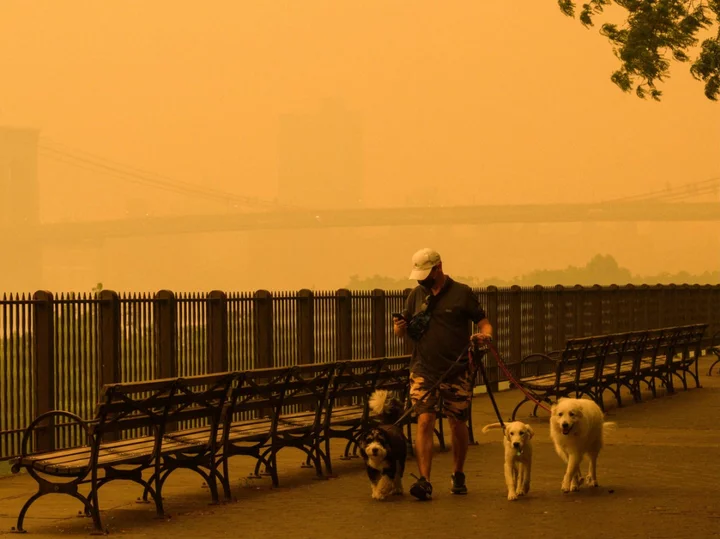
How to protect pets from wildfire smoke amid air quality alert
New York City and much of the tri-state area has been blanketed by smoke caused by raging wildfires in Canada. The poor air conditions have continued to spread throughout the northeastern United States. On Wednesday (7 June), New York City was ranked number one for the worst air quality in the world, with the Air Quality Index (AQI) at 342 and air pollution levels described as “hazardous”. Many officials have since advised people to limit their time outdoors and wear masks to protect themselves from the smoke. Public schools have also cancelled outdoor activities, including recess and gym classes. Follow for live air quality alert updates. Experts estimate that each hour of exposure to wildfire smoke is equivalent to smoking cigarettes continuously for the same amount of time, but that’s just for humans. Imagine how wildfire smoke affects our beloved pets? In fact, poor air quality may pose an even greater risk to animals because of their much smaller size. Here’s how to protect your pets from wildfire smoke as air quality alerts continue throughout New York. The biggest danger to pets comes from the fine particles found in air pollutants, which can get into the lungs and cause a variety of health issues – like eye irritation or respiratory problems. Some of the most vulnerable pets are older animals suffering from heart or lung disease. Certain breeds, such as pugs and bulldogs, may be especially at risk of inhaling too much smoke, according to the American Kennel Club. There are several signs that indicate a pet may be having problems from poor air quality. According to the US Environmental Protection Agency (EPA), some of the symptoms include coughing or gagging (particularly in cats), red or watery eyes, inflammation of the throat or mouth, trouble breathing, fatigue or weakness, and reduced appetite or thirst. The first thing pet owners should do at the sign of wildfire smoke exposure is to call their veterinarian. In the meantime, saturating a cotton ball with lukewarm water and squeezing it over an animal’s eyes can help with irritation and flush them out. In order to protect pets from wildfire smoke, try to reduce their exposure as much as possible. For outdoor pets like horses or livestock, bring these animals into a room with good ventilation, such as a utility room or garage. The EPA also states that smoke is especially tough on pet birds because of the construction of their respiratory systems. Birds that are exposed to too much smoke may act lethargic or struggle to breathe, and may sit in the bottom of their cages. Keeping the indoor air clean can also help protect animals against wildfire smoke. Pet owners should keep their windows closed and their pets in a room with an air purifier. Activities such as frying foods, burning candles, or using a fireplace can also be bad for pets because it adds air pollutants to your home. If necessary, pet owners take short potty breaks with their dog or cat before returning inside. It’s probably not best to go on a long run with an animal when air quality alerts are in effect, either. Read More Air quality – live: New York hits record pollution as Canada wildfire smoke shuts airports and risks millions From masks to AC units: All the dos and don’ts to keep safe from wildfire smoke New York air pollution spikes to hazardous ratings as wildfire smoke plagues East Coast From masks to AC units: All the dos and don’ts to keep safe from wildfire smoke ‘Fearful’ Shannen Doherty reveals her cancer has spread to her brain Fitness fanatic, 26, diagnosed with stage 4 cancer after feeling dizzy
2023-06-08 05:56

Arkansas Symphony Orchestra Appoints Geoffrey Robson as Music Director
LITTLE ROCK, Ark.--(BUSINESS WIRE)--Jun 7, 2023--
2023-06-08 05:20

Newmont Promotes Suzanne Retallack to Chief Safety and Sustainability Officer
DENVER--(BUSINESS WIRE)--Jun 7, 2023--
2023-06-08 05:17

RevBio is Awarded a $2 Million Grant to Advance the Development of its Novel Dental Adhesive Bone Scaffold Product
LOWELL, Mass.--(BUSINESS WIRE)--Jun 7, 2023--
2023-06-08 05:16

Virginia regulators advance Youngkin plan to leave climate initiative he calls ineffective
Virginia regulators have voted to advance Republican Gov. Glenn Youngkin’s plan to withdraw from a multistate carbon cap-and-trade program
2023-06-08 04:53

Missouri governor signs gender-affirming care ban for minors and anti-trans sports bill
Missouri's Republican Gov. Mike Parson on Wednesday signed into law two bills targeting the rights of transgender people in the state, including a ban on gender-affirming care for minors and a prohibition on trans women and girls from playing on sports teams that align with their gender.
2023-06-08 04:00

The Best Cell Phone Boosters for 2023
Especially if you are working from home, cellular dead zones aren't just annoying, they're mission-critical.
2023-06-08 03:52

From masks to AC units: All the dos and don’ts to keep safe from wildfire smoke
New York City and large parts of the tri-state area have been placed under Code Red air quality alerts as smoke from wildfires in Canada continue to create hazy skies. The city is currently ranked fifth for the worst air quality in the world, following Toronto, Hanoi, Dhaka and New Delhi, as the Air Quality Index on Wednesday reached “unhealthy” levels across New York and other major US cities. The poor air quality is a result of more than 400 wildfires raging in Canada, leading to mass evacuations in the province of Quebec. Meanwhile, schools in New York City and Washington DC have cancelled outdoor activities such as recess and gym. As the wildfires continue to rage on, air quality in New York is expected to get worse later Wednesday afternoon, according to forecasters. But amidst an ongoing climate crisis, many climate scientists warn that wildfires could become more frequent and intense. Many officials have urged people to limit their time outdoors and wear masks to protect themselves from the smoke. In fact, wildfire smoke carries a number of pollutants that can pose a number of risks and hazardous effects. Here’s a list of dos and don’ts to help keep yourself safe during the Code Red air quality alert. Wear a mask If the Covid-19 taught us anything, it’s that masks help keep us safe from getting sick. The same goes for wildfire smoke. Masks can protect you from deadly air pollutants found in wildfire smoke such as fine particulate matter, also known as PM 2.5. But not all masks are created equal. While surgical masks work fine in protecting your lungs from the smoke, the most preferred method of protection are N95 or KN95 masks. Both N95 and KN95 masks work by fitting tightly to the face and filtering air using multiple layers of material, which are designed to trap extremely small particles. Stay indoors, or take precaution if you need to go outside New York City Mayor Eric Adams told New Yorkers in a statement to “limit outdoor activity to the greatest extent possible.” In addition to masking up, people should also avoid performing strenuous activities outside – such as exercising or biking – and change their clothes once they return home. Air purifiers vs air conditioners Outdoor air, including fine particles from wildfire smoke, can also enter your home through open windows, vents, or window air conditioning units. The Environmental Protection Agency (EPA) recommends using a portable air purifier to help improve indoor air quality. Indoor fans can also be used to help circulate air. The EPA also states that central AC systems, in which air is cooled and distributed through ducts, are safe to use during air quality alerts. “If you have an HVAC system with a fresh air intake, set the system to recirculate mode, or close the outdoor intake damper,” the agency said. As for window AC units, the EPA warns against running the portable AC during “smoky conditions because it can result in more smoke being brought inside.” Take steps to save energy and reduce pollution New Yorkers are encouraged to avoid activities that could create more fine particles indoors, such as smoking cigarettes; spraying aerosol products; using gas, propane or wood-burning stoves and furnaces; frying or broiling food; and burning candles or incense. The New York State Department of Environmental Conservation also recommends closing the blinds or shades to preserve cooled air, and limiting use of household appliances. Follow for live air quality alert updates. Read More Air quality – live: New York under Code Red alert and kids banned from outside play over Canada wildfire smoke Wildfire smoke tracker: Where the air pollution is headed next NYC and DC public schools cancel outdoor activities as wildfire smoke plagues East Coast As Pride Month begins: 5 LGBTQ+ icons who have helped shape pop culture and history Al Pacino, 83, expecting his fourth child with 29-year-old girlfriend Pest control expert weighs in on viral blue sofa debate
2023-06-08 02:54

US doctors forced to ration as cancer drug shortages hit nationwide
One woman denied a chemotherapy drug compared the situation to "triage on the battlefield".
2023-06-08 02:29

Egypt bans Dutch archaeologists over exhibit about black musicians
A museum says it is being unfairly punished for showing ancient Egypt's influence on black artists.
2023-06-08 01:57

Explainer-What are the health risks from wildfire smoke?
By Nancy Lapid The northeastern United States is blanketed under a pungent haze caused by smoke carried down
2023-06-08 01:54

Shannen Doherty shares behind the scenes of cancer battle
Actress Shannen Doherty is letting her social media followers in on the spread of her breast cancer.
2023-06-08 00:51
